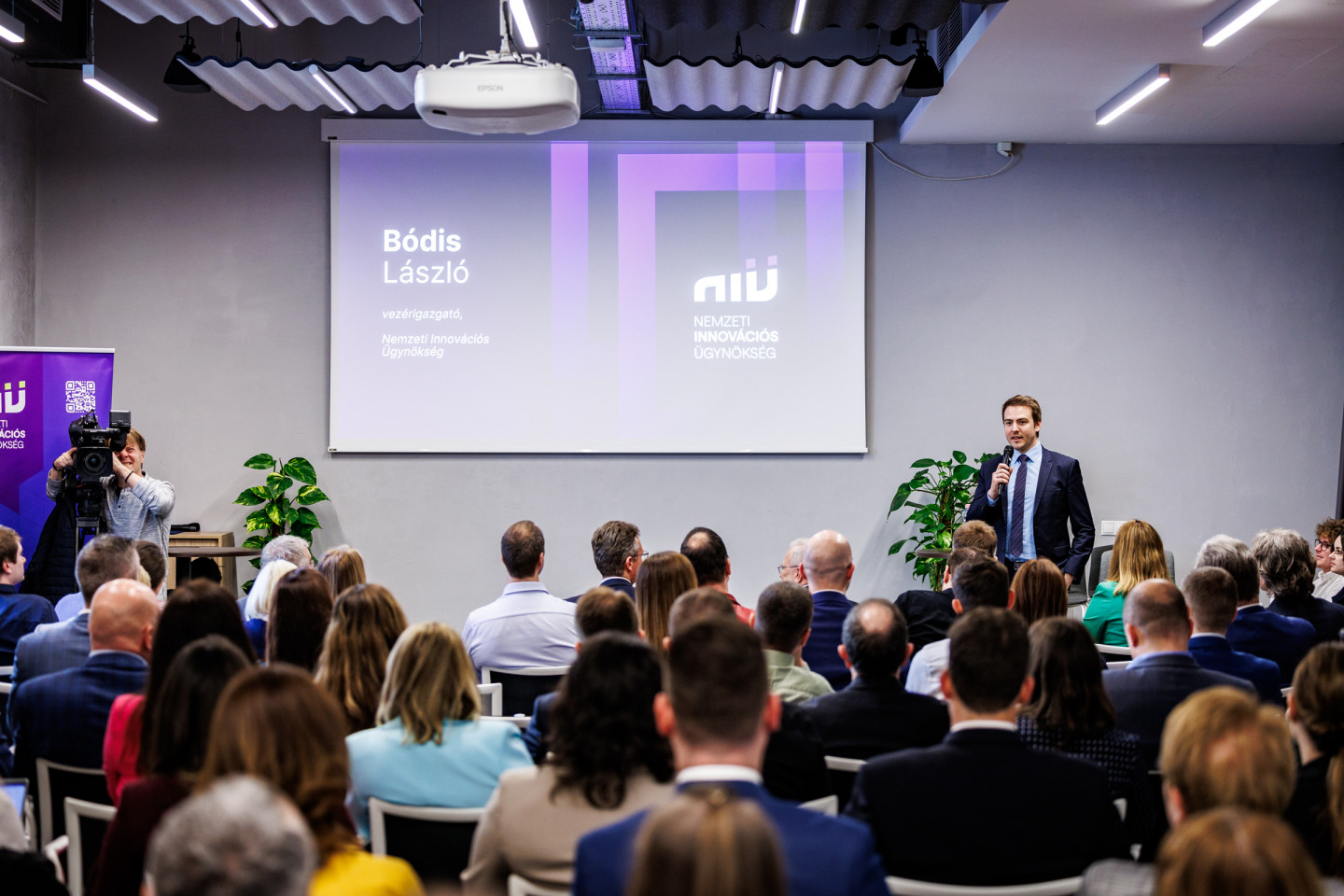The development of the Hungarian innovation ecosystem is driven primarily by strengthening partnerships between research institutions, universities and the industrial research network. Public actors should actively participate in this by supporting market participants and activating direct subsidies, said László Bódis, CEO of the National Innovation Agency (NIA), at the launch event of the organisation on 25 April 2024, at Create26. He added that the NIÜ is playing its part by providing knowledge exploitation and advisory services, supporting the market replication of knowledge created in universities and research institutes, and connecting companies open to innovation with the right partners.
According to Bódis, the Hungarian start-up ecosystem and the domestic environment supporting innovative businesses are not yet sufficient to increase the country's innovation performance, so one of the most important tasks is to strengthen the supply of entrepreneurs and researchers. He stressed that he is confident that emerging innovators will succeed in their own companies with the support of the NIÜ, instead of multinational companies. he sees the development of the Hungarian innovation ecosystem primarily in strengthening partnerships between research institutes, universities and the industrial research network. He believes that public actors should actively participate in this by supporting market players and activating direct subsidies. The NIÜ is playing its part by providing knowledge exploitation and advisory services, supporting the market replication of knowledge generated in universities and research institutes, and connecting companies open to innovation with the right partners. In addition to supporting promising start-ups and promoting their activities abroad and internationally, the NIÜ is committed to improving the international visibility of the Hungarian innovation system and to strengthening the innovation climate at home. The agency is demonstrating this by organising international innovation events in Hungary this year, he said.
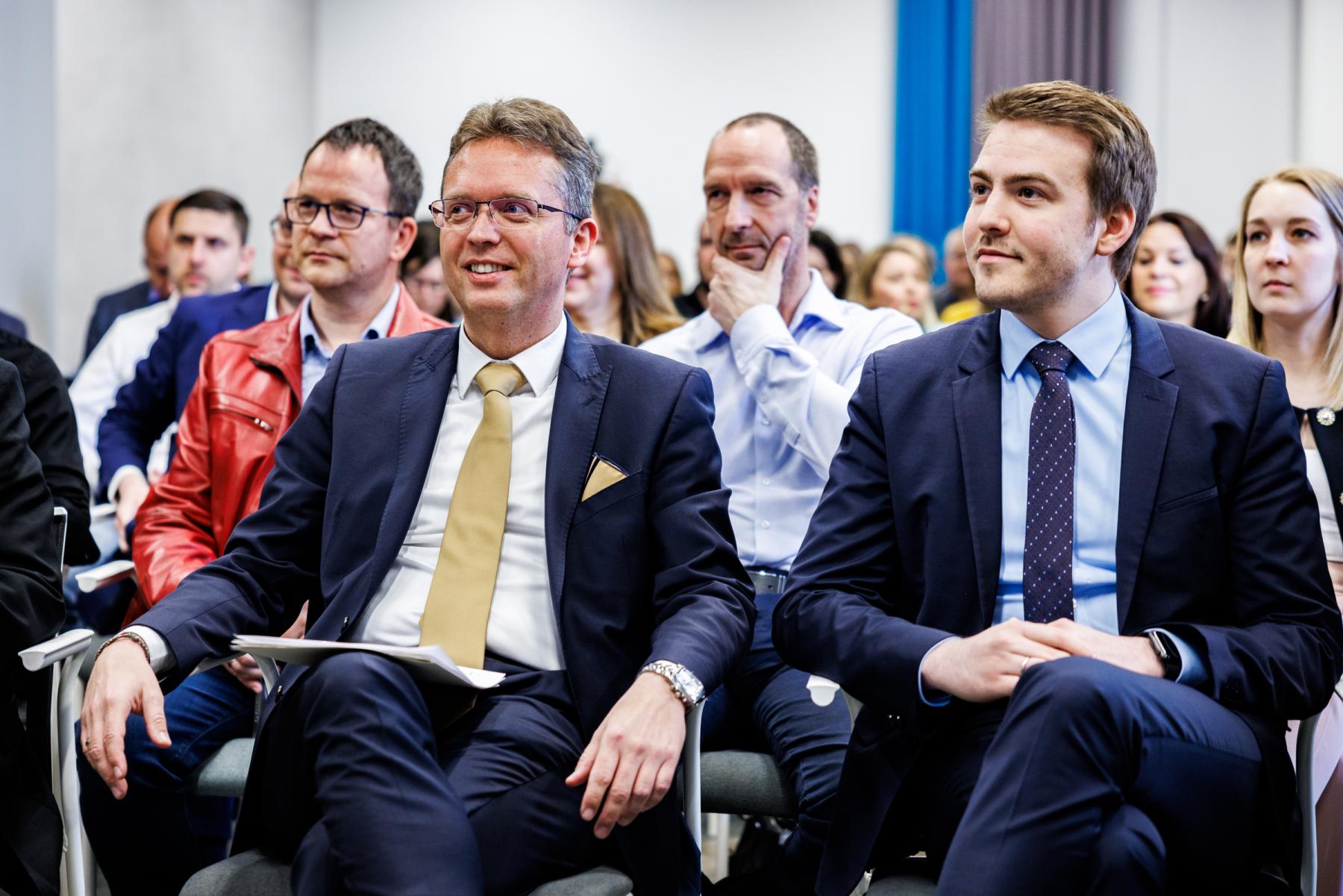
Balázs Hankó, Minister of State for Innovation, Higher Education, Vocational Training and Adult Education of the Ministry of Culture and Innovation (KIM), highlighted in his welcome speech that Hungary's competitiveness is strengthened by the applications launched under the Neumann János Programme with a total budget of almost HUF 340 billion. He said the funds would help Hungary to become one of Europe's top 10 innovators by 2030, with 1 of its universities among the world's top 100, at least 3 among Europe's best and its vocational education and training a world champion. In recent years, the research network, higher education and the innovation system have been renewed, the Hungarian innovation system has reached a new level, 12 Hungarian universities are already in the top 5 percent, and there are already Hungarian universities in the top 1 percent, he said, explaining his expectations.
The Minister of State said that 147 billion forints of the funds for the tenders to be launched in May under the Neumann János Programme will be allocated to this year's innovation programme strategy, while 193 billion forints will be allocated to EU-funded calls. The innovation calls will provide career-long support for researchers, contribute to the internationalisation of Hungarian higher education through support for university students, and encourage infrastructure and methodological improvements in vocational education and training. University students can apply for mobility and mentoring schemes, while vocational students receive career guidance and career counselling. The bulk of the funding will go to businesses to set up innovation partnerships with researchers, universities and other training places. The programmes will result in 200 new patents and products, which could generate at least HUF 50 billion in additional revenue a year, he added.
The second half of the event included two round-table discussions to learn more about the Agency's tasks and operations, while the final pre-networking event was the launch of the NIÜ Talx discussion series, which focused on current issues in the startup ecosystem.
Education, knowledge transfer, e-learning, communication
The first round table focused on the activities of the NIÜ in the field of education, training and communication. Mátyás Kutni, Director of Education Services, said that one of their tasks is to raise interest in science and technology among primary and secondary school students, thus promoting research careers, one of the main tools of which is the Selye János Student Lab network. In the case of the laboratories carrying out career motivation activities, he said that it was an important aspiration that in the future their operation should be carried out within a uniform framework, thus improving the quality of education and the utilisation and accessibility of the laboratories. Another of their tasks is to motivate students to become entrepreneurs. The Hungarian Startup University Program (HSUP) provides higher education students with entrepreneurship skills and the opportunity to develop and implement their own startup ideas. The programme will be renewed from next academic year: in September, it will be launched in English with a video-based curriculum, a new look and a more user-friendly platform. In addition, the launch of the HSUP Advanced training and scholarship programme, which aims to promote the creation of start-ups based on new scientific results or new technological solutions, will also play an important role.
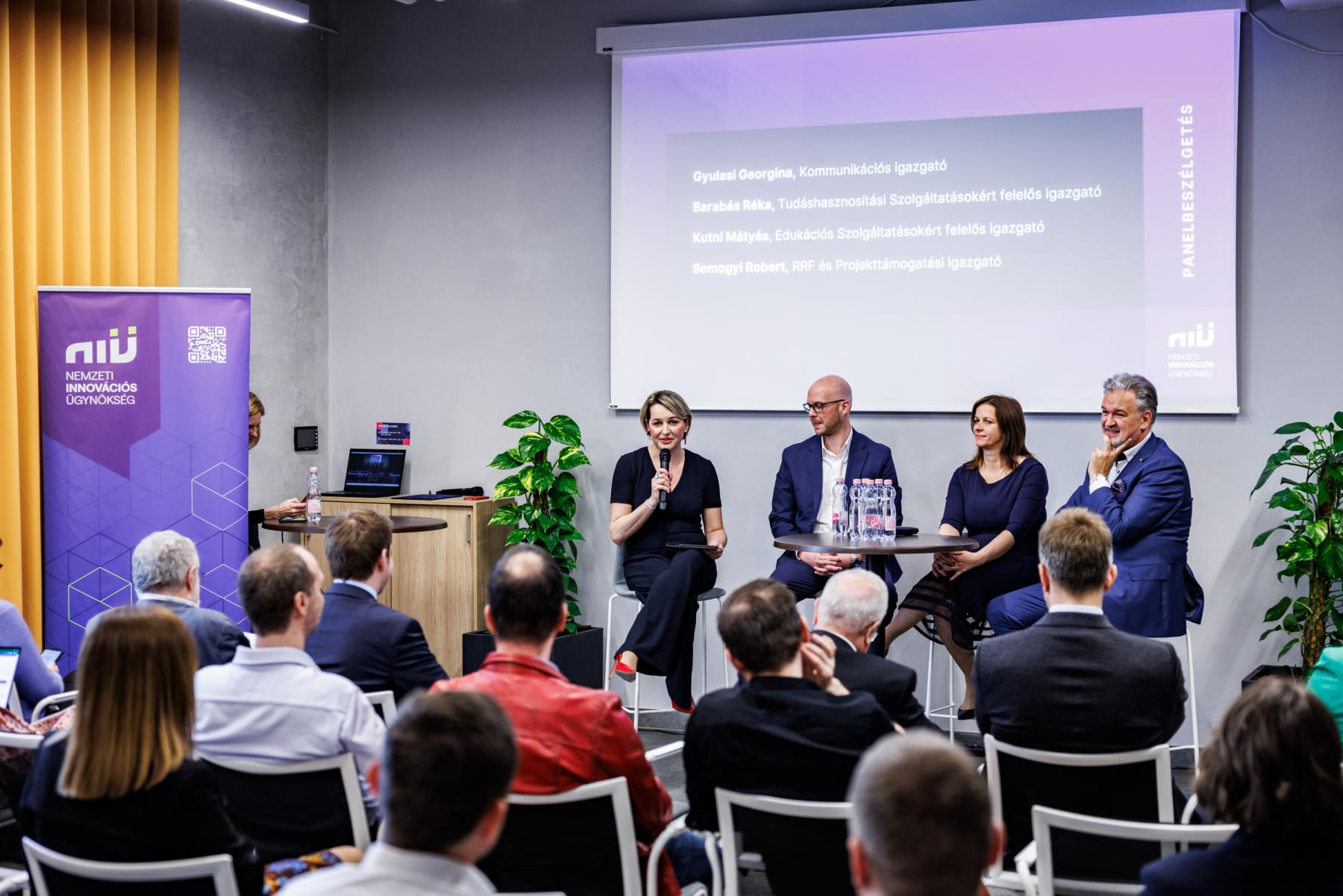
Réka Barabás, Director of Knowledge Utilisation Services, and her colleagues provide professional support to higher education institutions in their cooperation with the corporate sector. She said that two of their key activities are the project to set up university technology transfer companies (currently working with 5 institutions, but more universities and research institutes may join in the future) and the redesign of Science Park concepts with universities. The generation and monitoring of strategic partnerships between large companies and universities is also part of the Board's growing range of services. One of the most important conditions for achieving success with partners is to re-establish the relationship of trust between academia, business and the public sector, which has been somewhat eroded over the last decades.
Robert Somogyi, RRF and Project Support Director, described their work as the concrete at the bottom of the house: no one really sees it, but if it were missing, it would cause big problems. Their task is the development of digital curricula for universities: this means not only the basic digitisation of content and information, i.e. scanning, but also further digitisation steps leading to the digital transition, which includes the transformation of processes and thus of higher education institutions and their attitudes. This 17 billion HUF project will also make the work of teachers easier, as they will not always have to deliver the same material, students will have more interesting learning materials and more time for research, thus achieving a culture shift. He stressed the need for a change of mindset, because many people do not understand the importance of this endeavour, they stick to what is comfortable and familiar, but this does not help innovation to develop.
In addition to education, communication is also an important element of the NIÜ. Georgina Gyulasi, head of the agency's communications directorate, pointed out that in many people's minds the meaning of the terms innovation or start-up is still vague, so clarifying them is at least as important as spreading the organisation's operations and services as widely as possible. The difficulty here is that the stimulus threshold is nowadays crossed by videos of around 20 seconds.
Businesses, external market, analyses
The second round table discussion focused on the business sector. István Oláh, Director of Business Services at the NIÜ, also started with building trust: a process is underway to assess what help and services businesses need. They see untapped potential in SMEs, which are particularly well suited to attracting venture capital. He said that the agency supports companies by splitting the process from idea to significant market uptake and offering the best possible services at separate stages.
One important step for companies to succeed and survive is to compete in foreign markets. This is where the Foreign Markets Directorate, led by Nóra Rodek, can help. An important milestone of their work is the XPAND programme, which will be launched in April and will prepare companies for foreign markets on three levels, as well as offering the opportunity to participate in professional events and business tours abroad after a screening process. They will also establish international cooperation with professional organisations and innovation agencies, provide advice on international tenders (such as Horizon Europe) and help companies find partners and consortia to help Hungarian businesses to be better prepared for their presence abroad.
These services are well served and supported by the Ecosystem Analysis Directorate, led by András Surguta, who is setting up the NIÜ Data Analysis Centre. Data-driven decision making and the development of data-driven workflows are also important in Hungary, but it is not always the same how sophisticated the data, databases and analyses used for this purpose are. Their role is therefore twofold: on the one hand, they support the work of decision-makers and the Agency by providing credible and multifaceted analyses and, on the other hand, they will become data providers to the actors in the ecosystem this year.
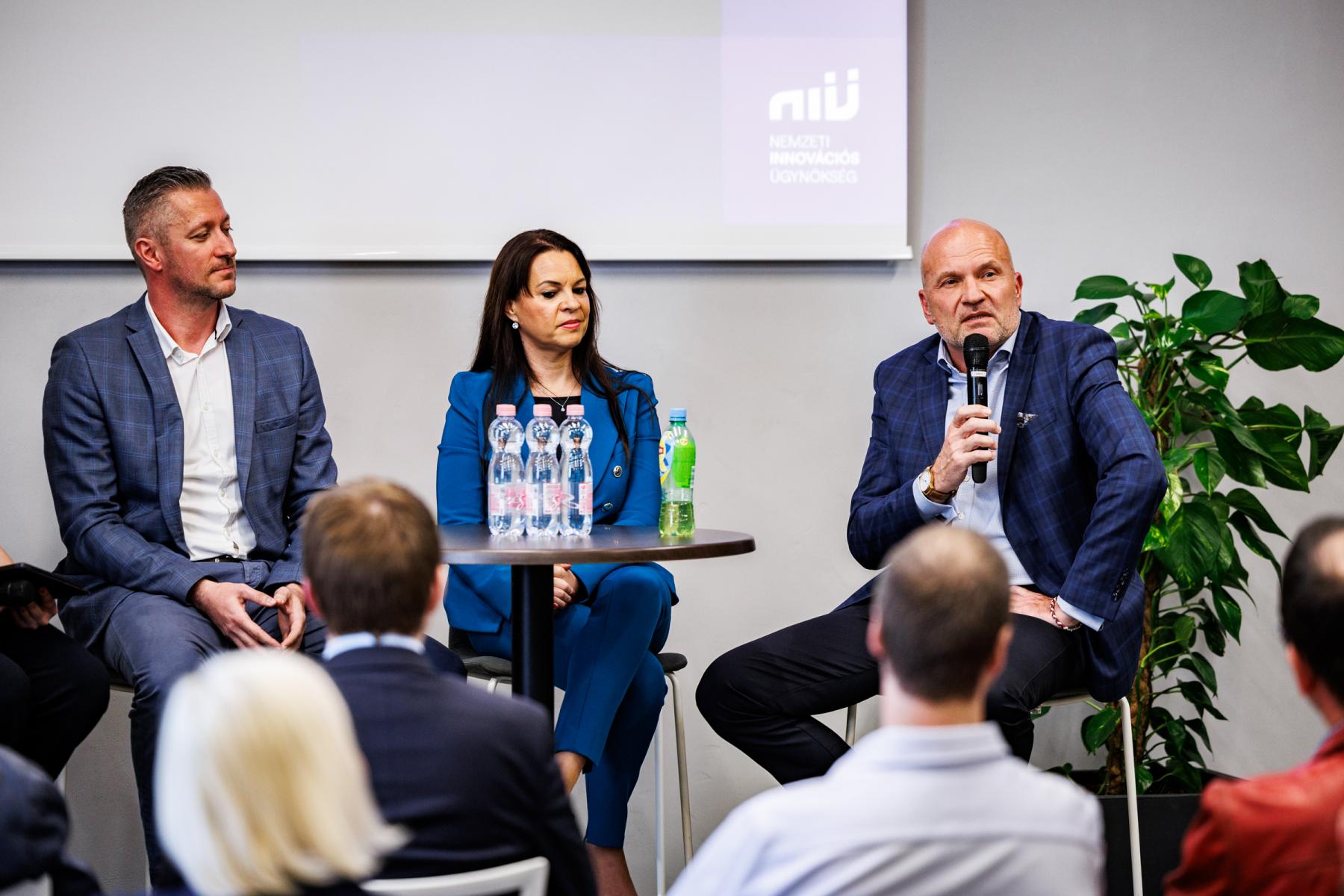
NIÜ Talx
The event concluded with the first introductory session of the NIÜ Talx discussion series. László Korányi, Deputy CEO of the agency, analysed the situation in Hungary with prominent representatives of the startup ecosystem.
One of the topics was the role of the state. Csongor Biás, director of Startup Hungary, pointed out that their latest research shows that in 2023, investments in startups dropped from €180 million to €65 million, for several reasons: on the one hand, many public projects have expired, and most of the investments were in growth-stage startups, of which there are few in Hungary and which needed less investment last year. At the same time, it highlighted that the state has done its part in regulation (e.g. on tax issues), which has been a great help to the ecosystem.
According to Péter Fáykiss, head of the Digitalisation Directorate of the Magyar Nemzeti Bank, the state can support startups in three ways: firstly, it should strengthen early-stage companies in terms of investment, secondly, in terms of regulation, and thirdly, by providing good educational programmes to raise awareness among young people.
Péter Csillag, director of VirtDB and president of the Hungarian Business Angel Network, added that he believes the differences between US and Hungarian regulations should be eliminated to make the Hungarian startup scene more prosperous. He would also put more emphasis on education, but he would also sensitise wealthy people who are wary of becoming angel investors.
Imre Hild, director of Óbuda Uni Venture Capital Zrt., said the focus should be on ensuring that venture capitalists do not try to tell startups what they want for their money. He believes that we should get in touch with ecosystems where unicorn companies exist, so that we can learn from good examples.
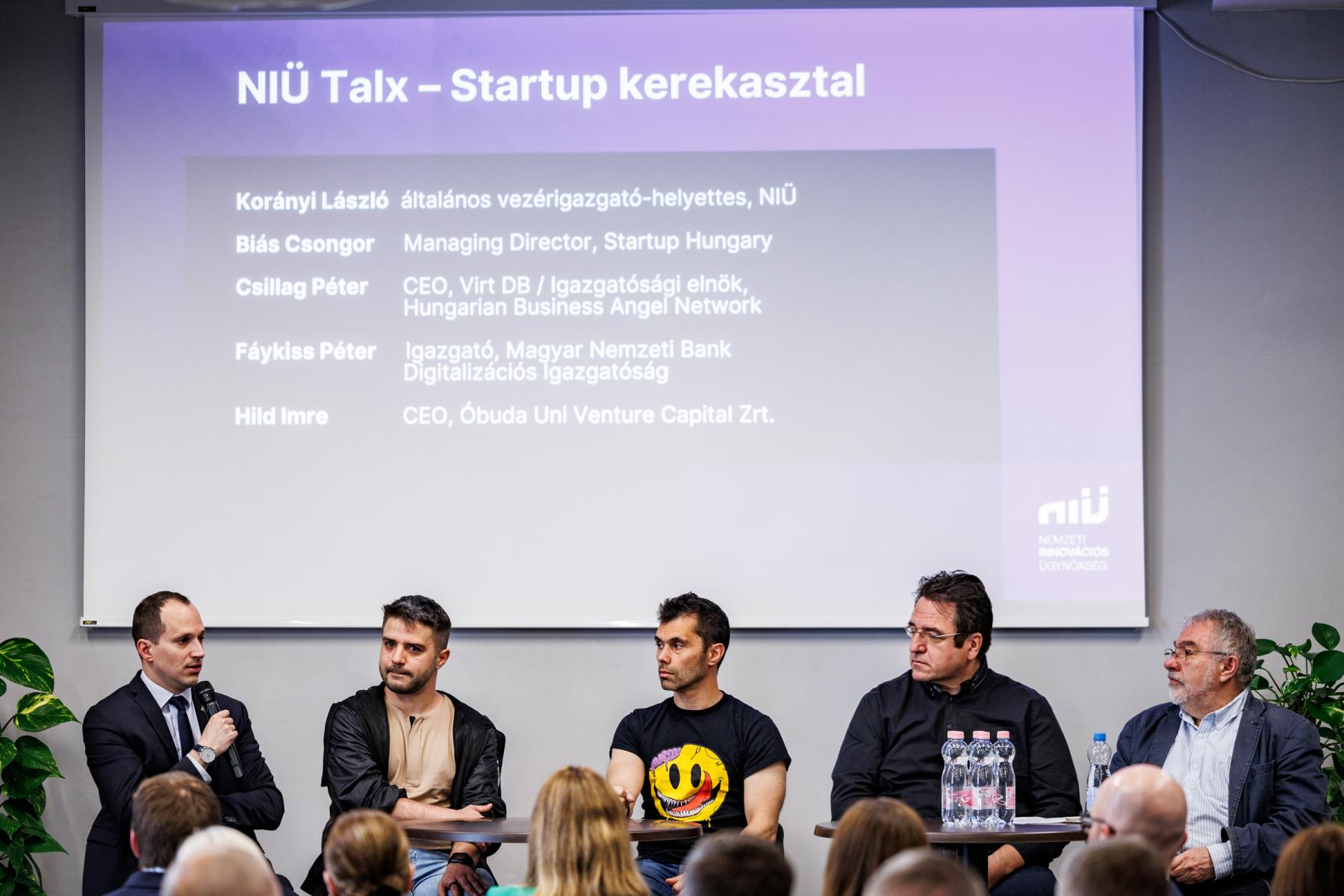
Afterwards, the deeptech sector was also discussed, and László Korányi pointed out that unfortunately there are very few deeptech companies operating in Hungary. According to Imre Hild, this is because most researchers have no idea how to get started in this direction, so connecting with the right entrepreneurs can be one of the keys. It's also worth paying attention to what's going on in the world, what the trends are: if McKinsey's research shows that $10 trillion will flow into the sustainability industry in the next 10 years, then maybe we should be paying more attention to that.
According to Péter Csillag, the lack of motivation may be the reason why there are so few deeptech companies in Hungary, while Csongor Biás believes that most startups in Hungary focus more on developing a product that sells itself. Here too, a change of mindset is needed, which is why he highlighted the role of the NIÜ, which can help the domestic ecosystem.
Péter Fáykiss again stressed the importance of education, saying that we need a large number of start-ups, as he believes that we should have 20 start-ups worth €300-500 million rather than one unicorn worth billions. Biás nuanced this by saying that he also thinks unicorns are needed, citing Skype as an example, where founders have reinvested part of their wealth in Estonian startups.




